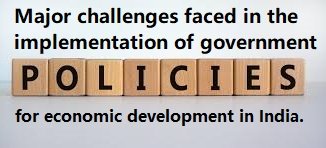AWIP, Governance, Government Policies, GS P5 (History, Polity, Governance...)
Q. Discuss the major challenges faced in the implementation of government policies for economic development in India. Provide examples of specific policies and their impact.
Implementing government policies for economic development in India faces several significant challenges. These challenges stem from a variety of factors, including administrative inefficiencies, political dynamics, socio-economic diversity, infrastructural deficits, and regional disparities. Here are some major challenges and examples of specific policies to illustrate their impact:
1. Administrative Inefficiencies and Corruption
Challenge: Bureaucratic red tape and corruption impede the effective implementation of policies. Delays, misallocation of resources, and leakages reduce the impact of government initiatives.
Example: The Mahatma Gandhi National Rural Employment Guarantee Act (MGNREGA) aims to provide at least 100 days of wage employment to rural households. While MGNREGA has been successful in creating employment and reducing poverty, its implementation is often marred by delays in wage payments, ghost beneficiaries, and corruption at various levels.
2. Infrastructural Deficits
Challenge: Poor infrastructure, including inadequate transport, power supply, and communication networks, hampers the effective implementation of development policies.
Example: The Pradhan Mantri Gram Sadak Yojana (PMGSY) focuses on improving rural road connectivity. Although it has significantly improved rural infrastructure, challenges like poor road quality and maintenance issues persist, limiting the overall impact on rural development and market accessibility.
3. Socio-economic Disparities
Challenge: Wide disparities in socio-economic conditions across different regions and communities make uniform policy implementation difficult. Marginalized groups often do not fully benefit from development programs.
Example: The Public Distribution System (PDS) aims to provide subsidized food grains to the poor. However, the effectiveness of PDS varies widely across states. In some areas, due to inefficiencies and corruption, the intended beneficiaries do not receive their entitlements, exacerbating food insecurity among the poorest communities.
4. Political Dynamics and Policy Continuity
Challenge: Frequent changes in government and political priorities can disrupt the continuity of policies, impacting long-term development goals.
Example: Land reform policies aimed at redistributing land to the landless have faced inconsistent implementation due to political resistance and lack of political will. This inconsistency has hampered efforts to address rural poverty and inequality.
5. Environmental and Sustainability Concerns
Challenge: Economic development policies often face challenges in balancing growth with environmental sustainability. Industrialization and urbanization can lead to environmental degradation if not managed properly.
Example: The Smart Cities Mission aims to promote sustainable and inclusive urban development. However, challenges such as inadequate funding, lack of coordination among stakeholders, and environmental concerns like waste management and pollution control have slowed progress in some cities.
6. Financial Constraints
Challenge: Limited financial resources and competing budgetary priorities can restrict the scope and scale of development programs.
Example: The Pradhan Mantri Awas Yojana (PMAY) aims to provide affordable housing to the urban poor. While it has made strides in increasing housing availability, financial constraints and land acquisition issues have limited its reach and effectiveness.
7. Education and Skill Development
Challenge: Ensuring access to quality education and skill development opportunities is crucial for economic development. However, disparities in educational infrastructure and quality affect outcomes.
Example: The Skill India initiative aims to train over 400 million people in various skills by 2022. Despite its ambitious goals, challenges such as inadequate training infrastructure, mismatch between skills and market demand, and varying quality of training providers have affected its overall success.
8. Healthcare Accessibility
Challenge: Ensuring equitable access to healthcare services remains a significant challenge, particularly in rural and remote areas.
Example: The Ayushman Bharat scheme aims to provide health coverage to economically vulnerable families. While it has improved access to healthcare for many, challenges like infrastructural deficits in public hospitals, shortage of medical professionals, and bureaucratic hurdles impact its implementation.
Conclusion
The implementation of government policies for economic development in India faces multifaceted challenges, ranging from administrative inefficiencies and infrastructural deficits to socio-economic disparities and financial constraints. Despite these challenges, various policies have made notable impacts, but continuous efforts to address these issues are essential to ensure more effective and inclusive development. Addressing these challenges requires a coordinated approach involving policy reforms, efficient administration, and active participation of all stakeholders to achieve sustainable and equitable economic growth.


